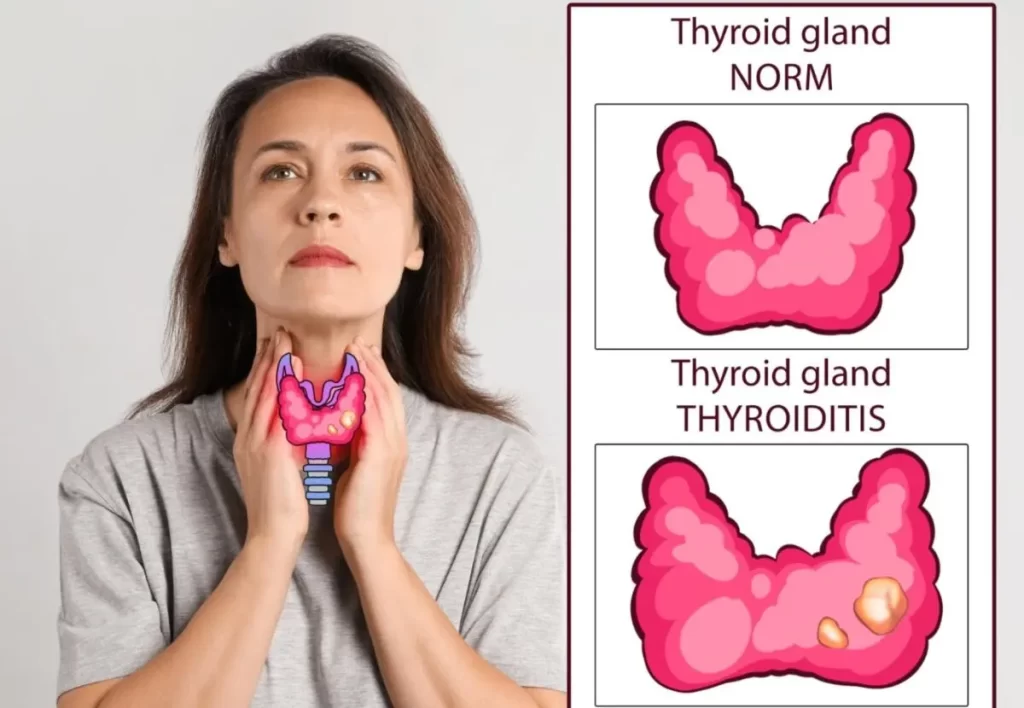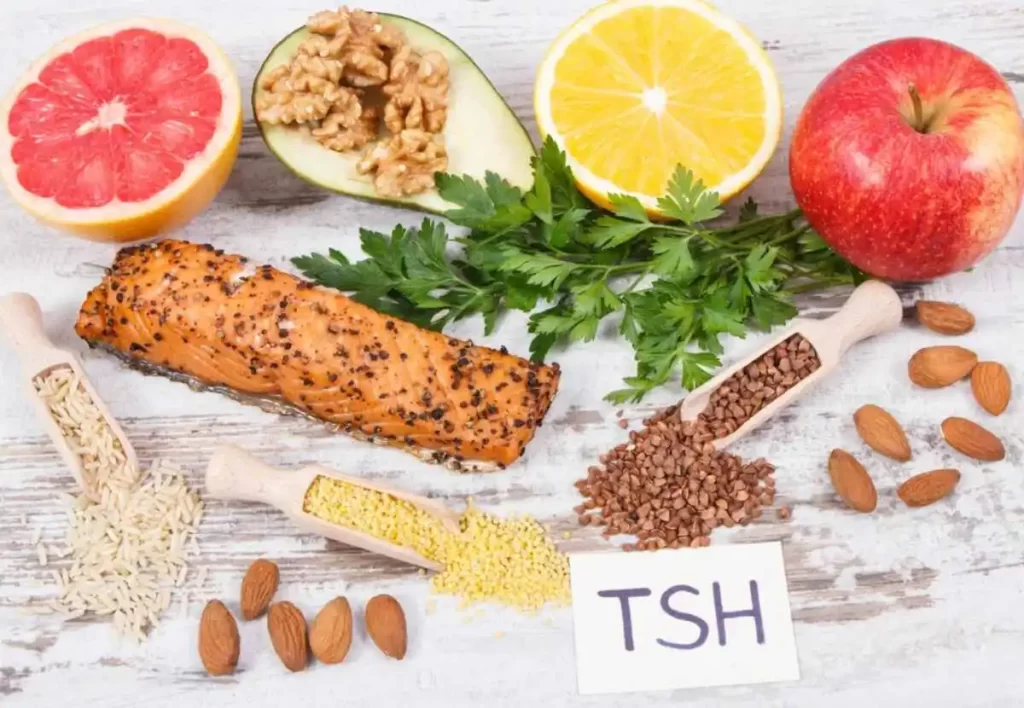Table of Contents
Introduction
Hashimoto disease, an autoimmune disorder that can significantly impair thyroid function, necessitates a comprehensive management approach, with diet playing a pivotal role. As the leading cause of hypothyroidism, understanding the connection between diet, Hashimoto’s, and thyroid health is crucial for those affected. A carefully curated diet not only supports thyroid function but also mitigates the autoimmune response, emphasizing the significance of nutritional choices in managing the condition. This article delves into how certain foods can influence thyroid health, guiding individuals through the dietary modifications necessary for managing Hashimoto disease effectively.
The following sections will explore the impact of an anti-inflammatory diet on thyroid health, identify foods to avoid to maintain optimal thyroid function, and outline specific diet plans that have been found beneficial for Hashimoto’s patients. By focusing on anti-inflammatory foods, understanding the foods detrimental to thyroid health, and adopting diet plans tailored to their needs, individuals with Hashimoto disease can take meaningful steps towards better health. These dietary strategies not only aim to support thyroid function but also improve overall well-being, offering a comprehensive overview for those seeking to manage their condition through diet.
Understanding Hashimoto's Disease and its Impact on the Thyroid
What is Hashimoto's Disease?
Hashimoto’s disease, also known as Hashimoto’s thyroiditis, chronic lymphocytic thyroiditis, and chronic autoimmune thyroiditis, is an autoimmune disorder that progressively attacks the thyroid gland 12. This gland, located at the base of the neck just below the Adam’s apple, is crucial for producing hormones that regulate numerous bodily functions 1. In Hashimoto’s disease, the immune system mistakenly targets and destroys thyroid cells, leading to a reduction in hormone production, a condition known as hypothyroidism 12.
How Hashimoto's Affects Thyroid Function
The impact of Hashimoto’s on thyroid function is profound and multifaceted. As the disease progresses, individuals may not initially notice symptoms, but over time, a significant decline in thyroid hormone production manifests in various ways 1. Common symptoms include fatigue, sensitivity to cold, constipation, and muscle weakness, among others 1. The reduced hormone levels can lead to complications such as goiter, heart problems, mental health issues, reproductive dysfunction, and in severe cases, myxedema, which requires emergency medical treatment 1.
The pathophysiology of Hashimoto’s involves the formation of antithyroid antibodies that attack the thyroid tissue, causing progressive fibrosis and a decrease in functional thyroid tissue 2. This autoimmune response is coupled with elevated thyroid-stimulating hormone (TSH) levels and lowered thyroxine (T4) levels, which are typical laboratory findings in this condition 2. Over time, the thyroid’s ability to produce hormones wanes, leading to various systemic effects including increased cholesterol levels, reduced cardiac output, and mental health disorders 12.
The thyroid’s role extends beyond hormone production; it influences nearly every organ system in the body, from metabolic rate to heart rate regulation 3. Therefore, the gradual decline in thyroid function due to Hashimoto’s can have widespread health implications, affecting everything from cardiovascular health to mental well-being 3.
Understanding the intricate details of Hashimoto’s disease and its impact on thyroid function is crucial for managing the condition effectively. By recognizing the symptoms and understanding the underlying autoimmune processes, individuals can seek appropriate treatments that may include dietary adjustments, hormone replacement therapies, and lifestyle changes to mitigate the effects of hypothyroidism and improve overall health.

Anti-Inflammatory Foods to Support Thyroid Health
Fruits and Vegetables
Incorporating a wide range of fruits and vegetables into the diet is crucial for individuals managing Hashimoto’s thyroiditis. These foods are rich in antioxidants and essential nutrients that can help reduce inflammation and support thyroid function. For example, berries, pears, apples, peaches, and citrus fruits provide vital vitamins and antioxidants that combat oxidative stress associated with thyroid disorders 4. Non-starchy vegetables like zucchini, artichokes, asparagus, carrots, and broccoli are recommended due to their low glycemic index and high nutrient content, which are beneficial for thyroid health 4.
Healthy Fats and Lean Proteins
Selecting the right types of fats and proteins is essential for maintaining a healthy thyroid. Foods high in omega-3 fatty acids, such as fatty fish including salmon and mackerel, are known for their anti-inflammatory properties 5. Lean protein sources, such as fish, eggs, and beans, provide essential amino acids without contributing to inflammation 6. Incorporating healthy fats like olive oil and avocados into meals can also support hormone balance and reduce inflammation 46.
Gluten-Free Grains and Seeds
For many individuals with Hashimoto’s, gluten can exacerbate thyroid dysfunction. Adopting a gluten-free diet may lead to improvements in thyroid function and overall health 7. Grains like brown rice, rolled oats, and quinoa, as well as seeds such as flax seeds and chia, are excellent alternatives that provide essential nutrients without the adverse effects of gluten 47. These foods are not only supportive of thyroid health but also contribute to a balanced diet by providing fiber, vitamins, and minerals.
In summary, a diet that emphasizes anti-inflammatory foods such as fruits, vegetables, healthy fats, lean proteins, and gluten-free grains can play a significant role in managing Hashimoto’s thyroiditis. By carefully selecting foods that support thyroid health, individuals can mitigate symptoms and improve their overall well-being.

Foods to Avoid for Optimal Thyroid Function
Added Sugars and Sweets
Individuals managing Hashimoto’s disease should be cautious about their intake of added sugars and sweets. Foods such as soda, energy drinks, cakes, cookies, ice cream, candy, and sugary cereals contain high levels of sugar which can exacerbate symptoms of thyroid dysfunction. The U.S. Food and Drug Administration recommends limiting daily sugar consumption to no more than 6 teaspoons for women and 9 teaspoons for men 8. Excessive sugar intake can lead to inflammation and blood sugar imbalances, significantly impacting those with hypothyroid conditions 8.
Fast Foods and Highly Processed Foods
Fast foods and highly processed foods are particularly detrimental for individuals with Hashimoto’s. These foods, including French fries, burgers, pizza, and processed snacks like chips and cookies, are typically high in unhealthy fats, added sugars, and salt, all of which can contribute to poor thyroid health 9. Moreover, these foods often contain synthetic ingredients and preservatives that may further harm the thyroid gland and overall health 9. Avoiding these foods can help reduce the risk of exacerbating thyroid symptoms and support overall well-being.
Gluten-containing grains and Soy Products
For many individuals with Hashimoto’s, gluten and soy can trigger or worsen symptoms. Gluten-containing grains such as wheat, barley, and rye, along with foods like bread and pasta, may increase antibody levels, which correlate with Hashimoto’s symptoms 10. Additionally, soy products, including soy milk and tofu, contain goitrogens, substances that can interfere with thyroid hormone production 11. It is often recommended to eliminate or reduce consumption of these foods to manage symptoms more effectively 410. For those who choose to avoid gluten, it is crucial to select gluten-free alternatives that do not contain other harmful additives 10.
Specific Diet Plans Beneficial for Hashimoto's Patients
Autoimmune Protocol (AIP) Diet
The Autoimmune Protocol Diet is a highly restrictive elimination diet designed for those with autoimmune diseases, including Hashimoto’s thyroiditis. This diet involves removing foods believed to cause inflammation, such as grains, legumes, soy, dairy, eggs, nuts, seeds, nightshade vegetables, and refined sugars. Additionally, it excludes coffee, chocolate, certain spices like coriander and cumin, as well as gums, alternative sweeteners, and food thickeners 12. While some individuals report a decrease in inflammatory markers like C-reactive protein, the improvements might also be attributed to an increased intake of vegetables rather than the diet itself. Notably, this diet is not endorsed by major medical associations due to a lack of solid research backing its effectiveness 12.
Gluten-Free or Grain-Free Diet
Research indicates a significant correlation between gluten intake and Hashimoto’s disease. Studies have shown that a gluten-free or grain-free diet can lead to a reduction in thyroid antibody levels and inflammatory markers in individuals with Hashimoto’s. For instance, one pilot study observed that women following a gluten-free diet experienced reduced thyroid antibody titers and a slight increase in 25-hydroxyvitamin D levels after six months 13. Additionally, removing grains from the diet may also benefit those with Hashimoto’s by decreasing inflammation and supporting thyroid function 14.
Sugar-Free and Dairy-Free Diets
Eliminating sugar and dairy from the diet may be beneficial for individuals with Hashimoto’s thyroiditis. Foods high in added sugars and dairy products can exacerbate symptoms of thyroid dysfunction. Reducing sugar intake is advised to avoid inflammation and blood sugar imbalances, while dairy elimination may help alleviate digestive issues and improve the absorption of thyroid medications 1215. Many people with Hashimoto’s who are sensitive to casein and whey proteins found in dairy need to completely avoid these products. Fortunately, there are numerous dairy-free alternatives available that can help maintain a balanced and enjoyable diet 15.

Conclusion
Through the discourse on diet’s impact on Hashimoto disease, it’s evident that dietary choices play a crucial role in managing this autoimmune condition. Emphasizing anti-inflammatory foods while avoiding those that exacerbate thyroid dysfunction offers a pathway to mitigating the adverse effects of this disease. The article outlined how a curated diet, including a wide variety of fruits, vegetables, lean proteins, and gluten-free grains, supports thyroid health and overall well-being. Equally, steering clear of added sugars, highly processed foods, and gluten-containing grains minimizes the risk of worsening Hashimoto’s symptoms, highlighting the importance of diet in the management of thyroid health.
Furthermore, the exploration of specific diet plans such as the Autoimmune Protocol (AIP), gluten-free, grain-free, sugar-free, and dairy-free diets underscores the potential benefits of dietary interventions in addressing Hashimoto’s. While individual responses to these diets may vary, their overall significance in reducing inflammation, improving thyroid function, and lowering thyroid antibody levels cannot be overstated. Ultimately, these dietary strategies not only offer hope for better health and quality of life for those with Hashimoto’s but also emphasize the broader implications of nutrition on autoimmune diseases, warranting further research and attention in this critical area of health management.
FAQs
What are some foods that enhance thyroid health?
Several foods are beneficial for thyroid health. Foods rich in iodine such as seaweed, brazil nuts, fish, and eggs are crucial for effective thyroid function. Additionally, berries and cruciferous vegetables are supportive of thyroid health. It is advisable to avoid processed and fast foods.
What is an ideal breakfast for someone with Hashimoto’s disease?
A nutritious breakfast option for those with Hashimoto’s disease includes eggs, which are a lean source of protein and contain essential thyroid nutrients like iodine and selenium. Pairing eggs with toast and sliced avocado can provide a balanced and satisfying meal.
Is it safe to consume eggs if you have Hashimoto’s disease?
When following the autoimmune protocol (AIP), which is often recommended for individuals with autoimmune conditions like Hashimoto’s, it might be necessary to eliminate eggs. The AIP diet aims to remove foods that could cause an inflammatory response, including dairy, pulses, nuts, eggs, coffee, and food additives.
Which type of meat is recommended for individuals with Hashimoto’s disease?
Red meat is beneficial for those with Hashimoto’s disease as it is a rich source of selenium, iron, and zinc, all of which are vital for the synthesis of thyroid hormones. Additionally, red meat provides vitamin B12, the deficiency of which is linked to autoimmune thyroid diseases (AITD).
References
[1] – https://www.mayoclinic.org/diseases-conditions/hashimotos-disease/symptoms-causes/syc-20351855
[2] – https://www.ncbi.nlm.nih.gov/books/NBK459262/
[3] – https://www.niddk.nih.gov/health-information/endocrine-diseases/hashimotos-disease
[4] – https://www.baptisthealth.com/blog/family-health/hashimoto-s-thyroiditis-diet-best-worst-food-list
[5] – https://pharmeasy.in/blog/hashimoto-diet-a-comprehensive-guide-based-on-latest-research/
[6] – https://www.health.harvard.edu/staying-healthy/healthy-eating-for-a-healthy-thyroid
[7] – https://www.medicalnewstoday.com/articles/321197
[8] – https://npthyroid.com/tipsresource/sugars-connection-to-hypothyroid-symptoms/
[9] – https://www.ncbi.nlm.nih.gov/pmc/articles/PMC6146358/
[10] – https://www.healthline.com/nutrition/hashimotos-and-gluten
[11] – https://thyroidpharmacist.com/articles/soy-and-hashimotos/
[12] – https://www.bswhealth.com/blog/the-autoimmune-protocol-aip-diet-does-it-actually-help-thyroid-conditions
[13] – https://dietitiansondemand.com/does-a-gluten-free-diet-effectively-treat-hashimotos-thyroiditis/
[14] – https://www.healthline.com/nutrition/hashimoto-diet
[15] – https://thyroidpharmacist.com/articles/going-dairy-free-to-reverse-hashimotos/







